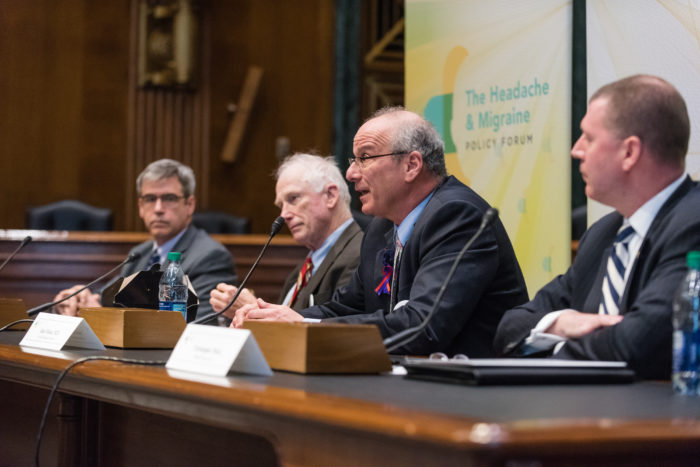Add migraine to the long list of battles faced by veterans of the United States Armed Services.
In a Tuesday policy panel sponsored by The Headache and Migraine Policy Forum, experts from across the health care and veterans support spectrum weighed in on how migraine and headache disorders impact veterans – and whether these women and men can access the treatment they need.

The conversation highlighted several issues:
Personalized Treatment
“If you’ve seen one patient, you’ve seen one patient,” explained James R. Couch, Jr., MD, PhD, the acting medical director for the Comprehensive Inpatient Integrated Rehabilitation Program at Oklahoma City’s VA Medical Center. “Don’t try to mash them all together and say ‘this should work for everybody.’”
Iraq and Afghanistan’s Impact
“These soliders were changed while they were protecting us and our freedoms,” noted Alan Finkel, MD, who treats active-duty soliders at Fort Bragg. Calling affected veterans, “armies of one,” Dr. Finkel alluded to migraine comorbidities such as severe depression, PTSD, sleep disturbances and anxiety.
Access
“I am amazed on a daily basis at the breadth of the services that are available and can be made availalbe to our veterans,” noted Donald S. Higgins, MD, the national program director for neurology at the Veterans Health Administration. Dr. Higgins noted that life-changing, cutting-edge therapies are available at the VA system, as are telehealth and teleneurology applications.
Panelists agreed on the need for more trained headache specialists. “We used to get no lectures on headache in medical school,” Dr. James Couch noted, adding, “Now we get two to three or more. Gradually, we’re improving. This should continue.”
Stigma
Christopher Meek, co-founder and CEO of SoldierStrong Access, described the impact of stigma on veterans and active duty servicemembers. The “warrior effect” can keep veterans from acknowledging their disorder and seeking treatment. Having migraine or another headache disorder “makes them feel like a failure,” Meeks explained, “It takes them to a dark place.”
David Charles, MD, neurologist and chairman of the Alliance for Patient Access, moderated the panel.
The Headache & Migraine Policy Forum advances public policies that promote accelerated innovation and improved treatments for headache and migraine sufferers. Its policy forum coincided with more than 225 Capitol Hill meetings as part of the annual Headache on the Hill advocacy day, sponsored by the Alliance for Headache Disorders Advocacy.
Headache on the Hill brings health care professionals, migraine advocates and patients to Capitol Hill to raise awareness about the impact of headache and migraine disorders and to seek increased research funding. This marked the event’s 11th year.

